美语发音练习1
- 格式:doc
- 大小:58.00 KB
- 文档页数:8
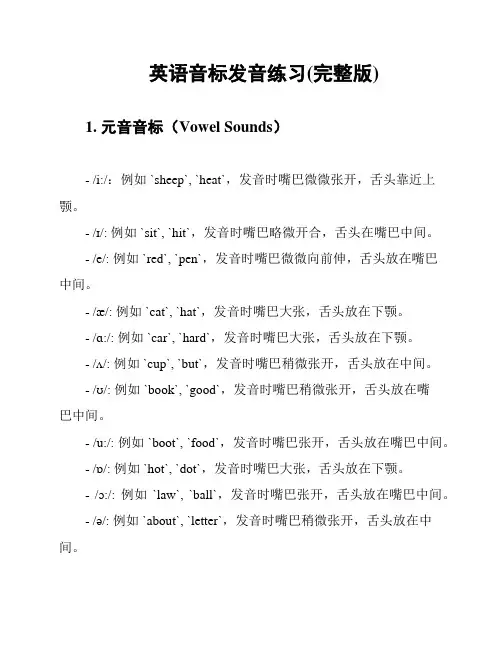
英语音标发音练习(完整版)1. 元音音标(Vowel Sounds)- /i:/:例如 `sheep`, `heat`,发音时嘴巴微微张开,舌头靠近上颚。
- /ɪ/: 例如 `sit`, `hit`,发音时嘴巴略微开合,舌头在嘴巴中间。
- /e/: 例如 `red`, `pen`,发音时嘴巴微微向前伸,舌头放在嘴巴中间。
- /æ/: 例如 `cat`, `hat`,发音时嘴巴大张,舌头放在下颚。
- /ɑ:/: 例如 `car`, `hard`,发音时嘴巴大张,舌头放在下颚。
- /ʌ/: 例如 `cup`, `but`,发音时嘴巴稍微张开,舌头放在中间。
- /ʊ/: 例如 `book`, `good`,发音时嘴巴稍微张开,舌头放在嘴巴中间。
- /u:/: 例如 `boot`, `food`,发音时嘴巴张开,舌头放在嘴巴中间。
- /ɒ/: 例如 `hot`, `dot`,发音时嘴巴大张,舌头放在下颚。
- /ɔ:/: 例如`law`, `ball`,发音时嘴巴张开,舌头放在嘴巴中间。
- /ə/: 例如 `about`, `letter`,发音时嘴巴稍微张开,舌头放在中间。
2. 辅音音标(Consonant Sounds)- /p/: 例如 `pen`, `spin`,发音时闭上双唇,突然张开。
- /b/: 例如 `bat`, `rab`,,发音时闭上双唇,用气声带发音。
- /t/: 例如 `top`, `cat`,发音时舌尖触到上牙龈。
- /d/: 例如 `dot`, `bed`,发音时舌尖触到上牙龈,用气声带发音。
- /k/: 例如 `cat`, `back`,发音时背部舌面和悬梁骨接触。
- /g/: 例如 `go`, `big`,发音时背部舌面和悬梁骨接触,用气声带发音。
- /f/: 例如 `finger`, `coffee`,发音时上牙齿底部和下唇接触。
- /v/: 例如 `very`, `move`,发音时上牙齿底部和下唇接触,用气声带发音。
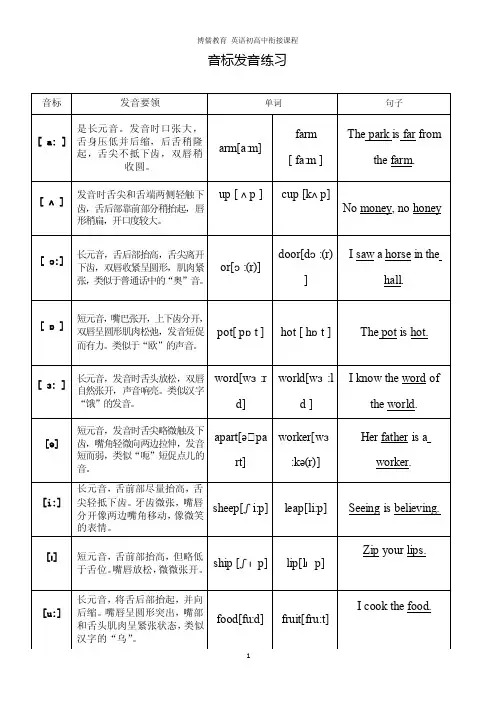
音标发音练习音标发音要领单词句子[ a: ] 是长元音。
发音时口张大,舌身压低并后缩,后舌稍隆起,舌尖不抵下齿,双唇稍收圆。
arm[a:m]farm[ fa:m ]The park is far fromthe farm.[ ʌ ] 发音时舌尖和舌端两侧轻触下齿,舌后部靠前部分稍抬起,唇形稍扁,开口度较大。
up [ ʌp ] cup [kʌp]No money, no honey[ ɔ:] 长元音,舌后部抬高,舌尖离开下齿,双唇收紧呈圆形,肌肉紧张,类似于普通话中的“奥”音。
or[ɔ:(r)]door[dɔ:(r)]I saw a horse in thehall.[ ɒ ] 短元音,嘴巴张开,上下齿分开,双唇呈圆形肌肉松弛,发音短促而有力。
类似于“欧”的声音。
pot[ pɒt ] hot [ hɒt ] The pot is hot.[ ɜ: ] 长元音,发音时舌头放松,双唇自然张开,声音响亮。
类似汉字“饿”的发音。
word[wɜ:rd]world[wɜ:ld ]I know the word ofthe world.[ə] 短元音,发音时舌尖略微触及下齿,嘴角轻微向两边拉伸,发音短而弱,类似“呃”短促点儿的音。
apart[əˈpart]worker[wɜ:kə(r)]Her father is aworker.[i:] 长元音,舌前部尽量抬高,舌尖轻抵下齿。
牙齿微张,嘴唇分开像两边嘴角移动,像微笑的表情。
sheep[ʃi:p] leap[li:p] Seeing is believing.[ɪ] 短元音,舌前部抬高,但略低于舌位。
嘴唇放松,微微张开。
ship [ʃɪp] lip[lɪp]Zip your lips.[u:] 长元音,将舌后部抬起,并向后缩。
嘴唇呈圆形突出,嘴部和舌头肌肉呈紧张状态,类似汉字的“乌”。
food[fu:d] fruit[fru:t]I cook the food.[ʊ] 短元音,发音时双唇收圆,肌肉尽量放松,舌后部抬起,舌尖离开下齿,振动声带即可。
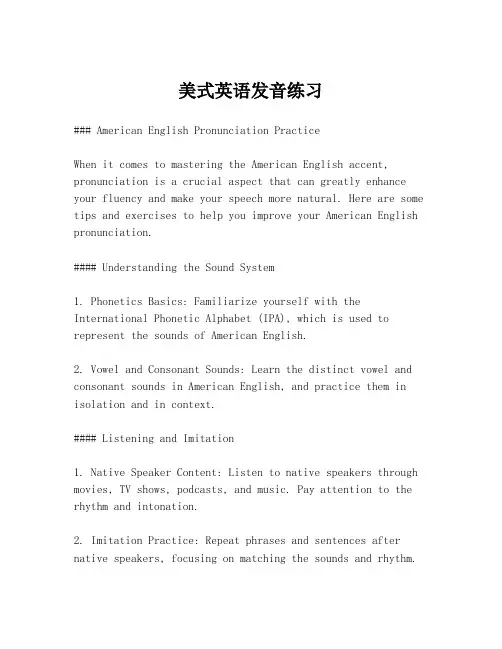
美式英语发音练习### American English Pronunciation PracticeWhen it comes to mastering the American English accent, pronunciation is a crucial aspect that can greatly enhance your fluency and make your speech more natural. Here are some tips and exercises to help you improve your American English pronunciation.#### Understanding the Sound System1. Phonetics Basics: Familiarize yourself with the International Phonetic Alphabet (IPA), which is used to represent the sounds of American English.2. Vowel and Consonant Sounds: Learn the distinct vowel and consonant sounds in American English, and practice them in isolation and in context.#### Listening and Imitation1. Native Speaker Content: Listen to native speakers through movies, TV shows, podcasts, and music. Pay attention to the rhythm and intonation.2. Imitation Practice: Repeat phrases and sentences after native speakers, focusing on matching the sounds and rhythm.#### Tongue TwistersTongue twisters are a fun way to practice specific sounds and improve your pronunciation.- "She sells seashells by the seashore."- "How can a clam cram in a clean cream can?"#### Minimal PairsMinimal pairs are pairs of words that differ by only one sound, which can be particularly challenging for non-native speakers.- "bit" vs. "bet"- "cat" vs. "cut"Practice distinguishing and pronouncing these pairs correctly.#### Stress and Intonation1. Word Stress: Identify the stressed syllables in words and practice emphasizing them.2. Sentence Stress: Learn where to place stress in sentencesto convey meaning and emotion.3. Intonation: Practice the rise and fall of your voice to sound more natural.#### Consonant ClustersConsonant clusters can be tricky, especially at the beginning or end of words.- "Sprint" (/sprɪnt/)- "Gift" (/gɪft/)Practice these words to get comfortable with the rapid succession of consonants.#### Rhotic "R"The American "r" sound is a rolled or trilled sound that canbe challenging for speakers of languages without this feature.- Practice the "r" sound in words like "red," "right," and "rural."#### Final ThoughtsConsistent practice is key to improving your American English pronunciation. Use a variety of resources, such as language learning apps, pronunciation guides, and practice with native speakers to refine your skills. Remember, the goal is notonly to sound like a native speaker but also to be understood clearly and confidently. Happy practicing!。
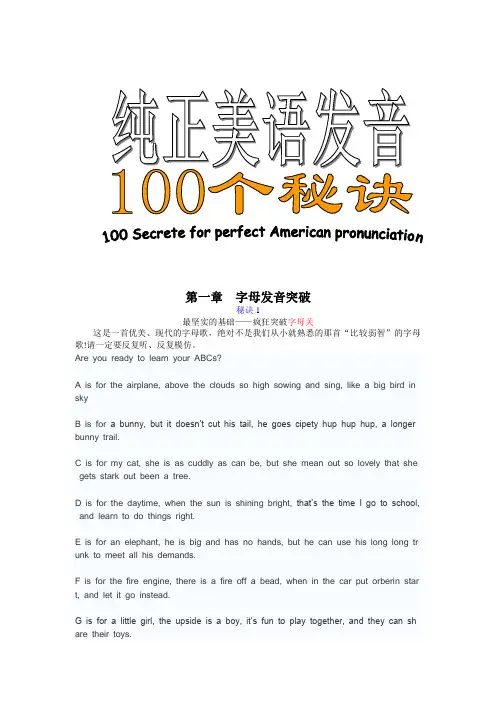
第一章字母发音突破秘诀1最坚实的基础——疯狂突破字母关这是一首优美、现代的字母歌,绝对不是我们从小就熟悉的那首“比较弱智”的字母歌!请一定要反复听、反复模仿。
Are you ready to learn your ABCs?A is for the airplane, above the clouds so high sowing and sing, like a big bird in skyB is for a bunny, but it doesn’t cut his tail, he goes cipety hup hup hup, a longer bunny trail.C is for my cat, she is as cuddly as can be, but she mean out so lovely that she gets stark out been a tree.D is for the daytime, when the sun is shining bright, that’s the time I go to school, and learn to do things right.E is for an elephant, he is big and has no hands, but he can use his long long tr unk to meet all his demands.F is for the fire engine, there is a fire off a bead, when in the car put orberin star t, and let it go instead.G is for a little girl, the upside is a boy, it’s fun to play together, and they can sh are their toys.H is for hello, which is something nice to say, it means I am glad to see you, any time of day.I is for an inside, like butterflies in beans, they are all a part of nature, so protect them if you please.J is for your jacket, when you go outside you wear it, it keeps you nice and warm, so you can play without care.K is for a kite, you can ply it in the wind, sometimes driving low, but damn it she start got again.L is for the leaves, that they are green and grow on trees, sometimes they turn co lors and fall to ground a piece.M is for music, there is music in this song, and if you learn the words to it, and y ou can sing along.N is for your nose, it’s in the middle of your face, and with your nose you can sm ell the cookies around just a bit.O is for an orange like holding sunshine in your hands, iplan own obnin, and then give some to your friends.P is f or your puppy, that’s a dog very small, when he gets older, just like you, he will be strong and tall.Q is for quiet, it’s the opposite of live, it’s hard when there are so many sounds, a nd when you’re in a crowd.R is for the rain, water falling from the sky, it’s hard to not get wet, but if you wa nt to, you can try.S is for a song, like the one I am singing to you, it can make you happy and can help you learn things tooT is for a teacher, at school or anywhere, they show you how to learn a lot like B and right we care.U is for umbrella, you can use it when it rains, keep you nice and dry, tip a sente nce that again.V is for a visit, and we can sometimes go, to grandmas or to aunts or to other friends you known.W is a welcome, that’s what I like say, when friends come to my house it means come no in and play.X is for a xenophon, it’s an instrument you know, or you can use an X when you play guitar tooY is for you, that’s the person that you are, to me and all your friends, and we ho pe that you go far.Z is for zoo, lots of animals to see, and everyone is very special, just like you an d me.And now you learn your ABCs, have fun, good bye… bye...26个字母、26个单词、26个句子,疯狂模仿,发音必会产生飞跃!A的读音为IPA: [♏♓]I’m afr ai d you’ve m a de a mist a ke.K.K: [♏]恐怕您搞错了。
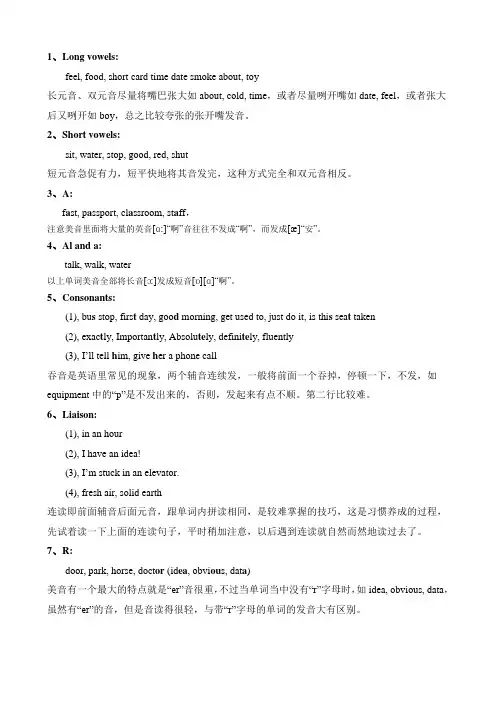
1、Long vowels:feel, food, short card time date smoke about, toy长元音、双元音尽量将嘴巴张大如about, cold, time,或者尽量咧开嘴如date, feel,或者张大后又咧开如boy,总之比较夸张的张开嘴发音。
2、Short vowels:sit, water, stop, good, red, shut短元音急促有力,短平快地将其音发完,这种方式完全和双元音相反。
3、A:f a st, p a ssport, cl a ssroom, st a ff,注意美音里面将大量的英音[ɑ:]“啊”音往往不发成“啊”,而发成[æ]“安”。
4、Al and a:talk, walk, water以上单词美音全部将长音[ɔ:]发成短音[ɒ][ɑ]“啊”。
5、Consonants:(1), bu s stop, firs t day, goo d morning, get used to, just do it, is thi s sea t taken(2), exac t ly, Importan t ly, Absolu te ly, defini te ly, fluently(3), I’ll tell h im, give h er a phone call吞音是英语里常见的现象,两个辅音连续发,一般将前面一个吞掉,停顿一下,不发,如equipment中的“p”是不发出来的,否则,发起来有点不顺。
第二行比较难。
6、Liaison:(1), in an hour(2), I have an idea!(3), I’m stuck in an elevator.(4), fresh air, solid earth连读即前面辅音后面元音,跟单词内拼读相同,是较难掌握的技巧,这是习惯养成的过程,先试着读一下上面的连读句子,平时稍加注意,以后遇到连读就自然而然地读过去了。
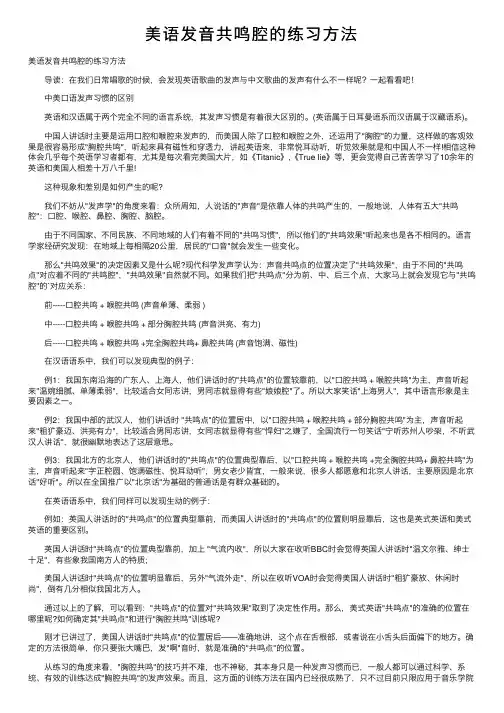
美语发⾳共鸣腔的练习⽅法美语发⾳共鸣腔的练习⽅法 导读:在我们⽇常唱歌的时候,会发现英语歌曲的发声与中⽂歌曲的发声有什么不⼀样呢?⼀起看看吧! 中美⼝语发声习惯的区别 英语和汉语属于两个完全不同的语⾔系统,其发声习惯是有着很⼤区别的。
(英语属于⽇⽿曼语系⽽汉语属于汉藏语系)。
中国⼈讲话时主要是运⽤⼝腔和喉腔来发声的,⽽美国⼈除了⼝腔和喉腔之外,还运⽤了"胸腔"的⼒量,这样做的客观效果是很容易形成"胸腔共鸣",听起来具有磁性和穿透⼒,讲起英语来,⾮常悦⽿动听,听觉效果就是和中国⼈不⼀样!相信这种体会⼏乎每个英语学习者都有,尤其是每次看完美国⼤⽚,如《Titanic》,《True lie》等,更会觉得⾃⼰苦苦学习了10余年的英语和美国⼈相差⼗万⼋千⾥! 这种现象和差别是如何产⽣的呢? 我们不妨从"发声学"的⾓度来看:众所周知,⼈说话的"声⾳"是依靠⼈体的共鸣产⽣的,⼀般地说,⼈体有五⼤"共鸣腔":⼝腔、喉腔、⿐腔、胸腔、脑腔。
由于不同国家、不同民族、不同地域的⼈们有着不同的"共鸣习惯",所以他们的"共鸣效果"听起来也是各不相同的。
语⾔学家经研究发现:在地域上每相隔20公⾥,居民的"⼝⾳"就会发⽣⼀些变化。
那么"共鸣效果"的决定因素⼜是什么呢?现代科学发声学认为:声⾳共鸣点的位置决定了"共鸣效果",由于不同的"共鸣点"对应着不同的"共鸣腔","共鸣效果"⾃然就不同。
如果我们把"共鸣点"分为前、中、后三个点,⼤家马上就会发现它与"共鸣腔"的`对应关系: 前-----⼝腔共鸣 + 喉腔共鸣 (声⾳单薄、柔弱 ) 中-----⼝腔共鸣 + 喉腔共鸣 + 部分胸腔共鸣 (声⾳洪亮、有⼒) 后-----⼝腔共鸣 + 喉腔共鸣 +完全胸腔共鸣+ ⿐腔共鸣 (声⾳饱满、磁性) 在汉语语系中,我们可以发现典型的例⼦: 例1:我国东南沿海的⼴东⼈、上海⼈,他们讲话时的"共鸣点"的位置较靠前,以"⼝腔共鸣 + 喉腔共鸣"为主,声⾳听起来"温婉细腻、单薄柔弱",⽐较适合⼥同志讲,男同志就显得有些"娘娘腔"了。
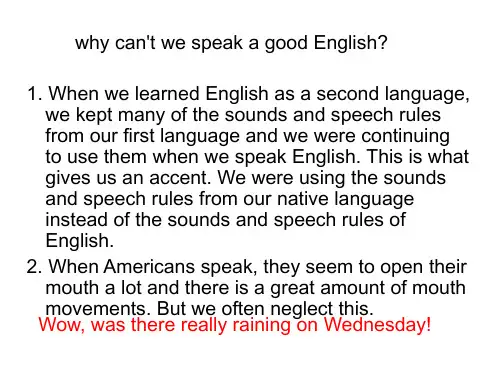
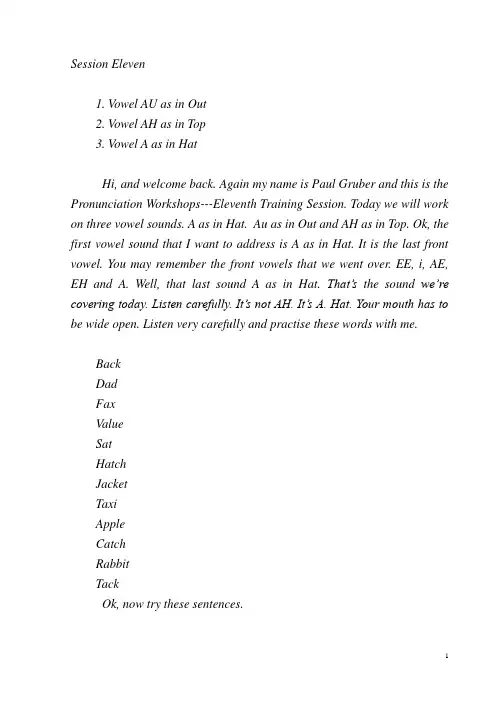
Session Eleven1. Vowel AU as in Out2. Vowel AH as in Top3. Vowel A as in HatHi, and welcome back. Again my name is Paul Gruber and this is the Pronunciation Workshops---Eleventh Training Session. Today we will work on three vowel sounds. A as in Hat. Au as in Out and AH as in Top. Ok, the first vowel sound that I want to address is A as in Hat. It is the last front vowel. You may remember the front vowels that we went over. EE, i, AE, EH and A. Well, that last sound A as in Hat. That’s the sound we’re covering today. Listen carefully. It’s not AH. It’s A. Hat. Your mouth has to be wide open. Listen very carefully and practise these words with me.BackDadFaxValueSatHatchJacketTaxiAppleCatchRabbitTackOk, now try these sentences.The fat cat wore a jacket.Pack your sack and bring your magnet.He sang about an actor named Jack.Very good. Now the next vowel sound that we’re going to cover is a little bit more tricky. It’s the AU sound, as in the word Out or the word Downtown. Many Asian speakers have difficulty with this sound. In order to say correctly, when you begin the sound, you start it with the sound that we just went over. A as in Hat. That A sound is what begins the AU sound. You then move your mouth forward and you close the sound sort of on the W. AAAAWWW, AAAAWWW. Did you hear that? It starts with A but then moves forward. AU. Let’s look at this word. Downtown. First of all, it’s not DonTan, which you may be saying, especially if you’re from China. To correctly say this sound with proper pronunciation. Here’s the trick. You have to make believe the vowel begins with the A sound as in Hat. Once you have that sound, then you close it. AU.Daaa wn. Ta Taaa wn, like that. You see if you don’t begin the vowel with the A sound in Hat. You’ll never say it correctly. Ok, now the whole word. Downtown. With practice, you’ll be able to say these sounds perfectly. You just have to remember that even though Down and other words like it are spelled with an O, you still attack the vowel with that A sound as in Hat. Downtown, like that. Let’s practise these words slowly and as you’re saying them. Keep that A sound in the back of your mind.NowHouseRoundLoudGownSoundOuchOutFoundSouthOunceReboundMouthBounceFlowerThousandSpoutCountOk, now try these sentences.The brown couch is downstairs.Her house is on the South side of the mountain.I was proud of the sounds that came out of my mouth.If these vowel sounds strange to you, just listen when American speakers talk an d you’ll start to notice that is exactly how we pronounce our words.Ok, new topic. How to pronounce the words Are and Our. You may not have known that there’s a pronunciation difference between these two words. Because many people pronounce Are and Our exactly the same. This is not correct however. Let me show you how to pronounce these words correctly. The first word Are has a strong R sound at the end. AR. Are you going? The second word Our has that AU sound like in the word Out and it sorts of has a hidden w in the middle AU-Wer. Think of the word Our as having two syllables. One two. AU-Wer, like that. Our car is overthere. Also, while we’re on the subject. Know the word Hour that is used for telling time is pronounced exactly the same way as in “Our meeting is in one hour.”Ok, let’s practise these sentences.Are you going to our house?Sales are down, but our projections for next year are very good.Our plans will be changing in the next hour.Are you sure that our meeting will be an hour late?Very good. Ok, here is another example of when English pronunciation can become very confusing. Do you know that there are words in English that are spelled with an O but are pronounced as AH. So even though these words that I’ m about to show you all spelled with an O, we pronounce all of these vowels with an AH. Here we go.Hot .You see, it’s not hot. [Ɔ]. It’s [ʌ/а] Hot.TopStopProbablyFollowNotBlobSockMopProductSolveProblemOk, let’s practise these sentences. Note that I put a line under all thewords which have an AH sound.Bob opened the box and followed the instructions.Tom put some cotton, rocks and a doorknob in his locker.My mom made a concrete model of a hockey rink.Very good. You may wanna watch this session again, especially the part when I talked about the au sound in words like Downtown. Ok? Now go practising and I’ll se e you at our next session. I’m Paul Gruber for the Pronunciation Workshop. Good bye!。
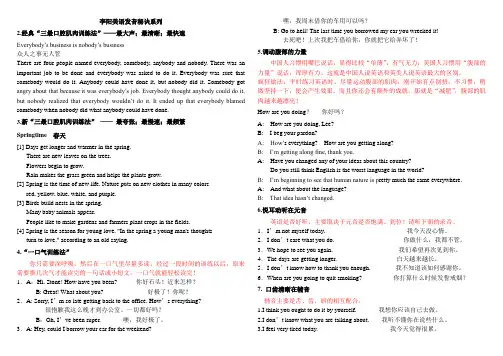
李阳美语发音秘诀系列2.经典“三最口腔肌肉训练法”——最大声;最清晰;最快速Everybody’s business is nobody’s business众人之事无人管There are four people named everybody, somebody, anybody and nobody. There was an important job to be done and everybody was asked to do it. Everybody was sure that somebody would do it. Anybody could have done it, but nobody did it. Somebody got angry about that because it was everybody’s job. Everybody thought anybody could do it, but nobody realized that everybody wouldn’t do it. It ended up that everybody blamed somebody when nobody did what anybody could have done.3.新“三最口腔肌肉训练法”——最夸张;最慢速;最频繁Springtime 春天[1] Days get longer and warmer in the spring.There are new leaves on the trees.Flowers begin to grow.Rain makes the grass green and helps the plants grow.[2] Spring is the time of new life. Nature puts on new clothes in many colorsred, yellow, blue, white, and purple.[3] Birds build nests in the spring.Many baby animals appear.People like to make gardens and farmers plant crops in the fields.[4] Spring is the season for young love. "In the spring a young man's thoughtsturn to love." according to an old saying.4.“一口气训练法”你只需要深呼吸,然后在一口气里尽量多读。
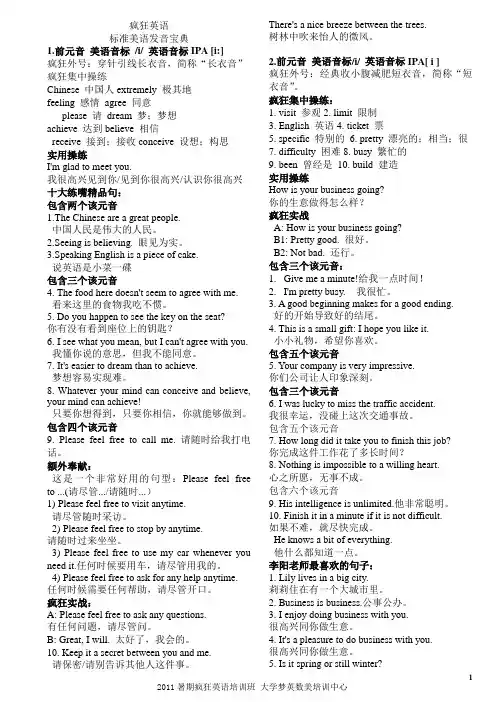
疯狂英语标准美语发音宝典1.前元音美语音标/i/ 英语音标IPA [i:]疯狂外号:穿针引线长衣音,简称“长衣音”疯狂集中操练Chinese 中国人extremely 极其地feeling 感情agree 同意please 请dream 梦;梦想achieve 达到believe 相信receive 接到;接收conceive 设想;构思实用操练I'm glad to meet you.我很高兴见到你/见到你很高兴/认识你很高兴十大练嘴精品句:包含两个该元音1.The Chinese are a great people.中国人民是伟大的人民。
2.Seeing is believing. 眼见为实。
3.Speaking English is a piece of cake.说英语是小菜一碟包含三个该元音4. The food here doesn't seem to agree with me.看来这里的食物我吃不惯。
5. Do you happen to see the key on the seat?你有没有看到座位上的钥匙?6. I see what you mean, but I can't agree with you. 我懂你说的意思,但我不能同意。
7. It's easier to dream than to achieve.梦想容易实现难。
8. Whatever your mind can conceive and believe, your mind can achieve!只要你想得到,只要你相信,你就能够做到。
包含四个该元音9. Please feel free to call me. 请随时给我打电话。
额外奉献:这是一个非常好用的句型:Please feel free to ...(请尽管.../请随时...)1) Please feel free to visit anytime.请尽管随时采访。
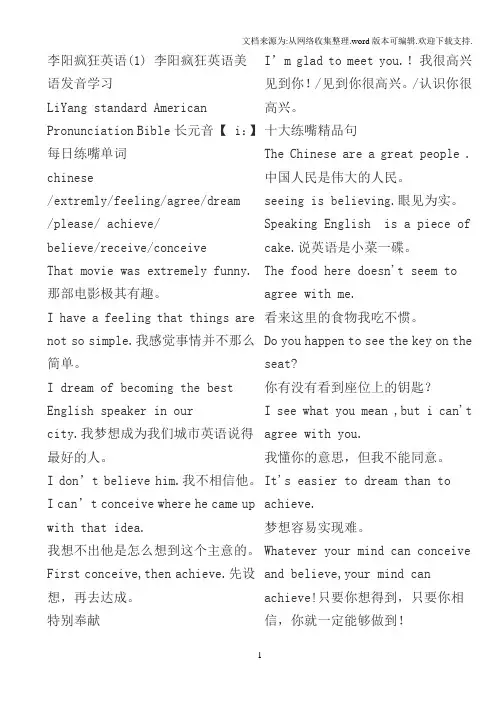
李阳疯狂英语(1) 李阳疯狂英语美语发音学习LiYang standard American Pronunciation Bible长元音【 i:】每日练嘴单词chinese/extremly/feeling/agree/dream/please/ achieve/believe/receive/conceiveThat movie was extremely funny.那部电影极其有趣。
I have a feeling that things are not so simple.我感觉事情并不那么简单。
I dream of becoming the best English speaker in ourcity.我梦想成为我们城市英语说得最好的人。
I don’t believe him.我不相信他。
I can’t conceive where he came up with that idea.我想不出他是怎么想到这个主意的。
First conceive,then achieve.先设想,再去达成。
特别奉献I’m glad to meet you.!我很高兴见到你!/见到你很高兴。
/认识你很高兴。
十大练嘴精品句The Chinese are a great people . 中国人民是伟大的人民。
seeing is believing.眼见为实。
Speaking English is a piece of cake.说英语是小菜一碟。
The food here doesn't seem to agree with me.看来这里的食物我吃不惯。
Do you happen to see the key on the seat?你有没有看到座位上的钥匙?I see what you mean ,but i can't agree with you.我懂你的意思,但我不能同意。
It's easier to dream than to achieve.梦想容易实现难。
纯正美语发音100个秘诀秘诀1最坚实的基础——疯狂突破字母关这是一首优美、现代的字母歌,绝对不是我们从小就熟悉的那首“比较弱智”的字母歌!请一定要反复听、反复模仿。
26个字母、26个单词、26个句子,疯狂模仿,发音必会产生飞跃!A的读音为IPA: [ei] I’m afraid you’ve made a mistake.K.K: [e] 恐怕您搞错了。
B的读音为IPA: [bi:] I won’t be able to finish my work.K.K:[bi] 我不能完成工作了。
C的读音为IPA:[si:] I don’t see what you mean.K.K[si] 我不懂你的意思。
D的读音为IPA[di:] I’ve heard a great deal about you.K.K[di] 久仰大名。
E 的读音为IPA[i:] He is easy to deal with.K.K[i] 他很容易打交道。
F的读音为IPA[ef] Will you sit on my left?K.K[Zf] 你坐在我左边好么?G的读音为IPA[dVi:] Lots of students wear jeans nowadays.K.K[dVi] 现在很多学生穿牛仔裤。
H的读音为IPA[eItF] Let me have a look at the book.K.K[etF] 让我看看这本书。
I的读音为IPA[BI] I could,and I should, but I won’t do it.K.K[BI] 这个我能做,我也应该做,但我不愿意做。
J的读音为IPA[dVeI] He was jailed for tow years.K.K[dVe] 他被囚禁了两年。
K的读音为IPA[keI] In any case, it’s none of your business.K.K[ke] 无论如何,那事于你无关。
正音练习/i:/Seeing is believing.Word training:each east eagle easy;keep sheep people team;free tea see agreePhrase training:1.t ake it easy2.a sweet dream3.i n three weeks4.m eet in the streetSentence training:1.D o you feed your dog with meat?2.A friend in need is a friend indeed.3.P lease keep it a secret4.I often see such a scene in the street.Tongue twister:1.Please eat sweet peas at ease before you sleep.2. The teacher repeated the speech to please the people.正音练习/I/Everybody’s business is nobody’s business. word training:ink ill issue investbig little live citytaxi badly thirty sunnyPhrase training:in the clinicbe interested ina lovely babythe foreign ministersentence training:1.The kids are listening to a story.2.Judy lives in a big city.3.The dish of fish is deliciou.4.My sister works in the ticket office. Tongue Twister1.It’s a pity it’s still misty in this city of Italy.2.If I assist a sister-assistant, will the sister’ssister-assistant assist me?正音联系:[æ]Don’t let the cat out of the bag. Words:apple angry active actionman glad family happy Phrases:hand in handas a matter of facta happy familySentences:The boy took my jacket.Marry your match.She comes from a very happy family.Who is that fat man standing at the back? Tongue twister:Can you can a can as a canner can can a can?A mad man says that Amanda has captured a fat panda.正音联系:[e]East or west, home is best.Words:egg end envy emptylet rest never bedPhrases:get ready forset up a tentstep by stepmy best friendSentences:I have a very good memory.Ted is one of my best friendsAll’s well that ends well.Better an empty purse than an empty head. Tongue Twister:Ten wealthy men met twelve beggars and fed them with fresh eggs and bread.A pleasant peasant keeps a pleasant pheasant and both the peasant and the pheasant are having a pleasant time together.。
/index.php英语家园附1:/D/舌头轻点一下上颚,类似汉语拼音的/d/,或K.K.音标的/d/,但不是随便地把/d/这个音发出来,而是用舌头碰一下上颚,带出下一个音。
附2:"-"表示前后两个词要连读,所以音节被拆开,发音的时候不再以原来的单词为单位,而以连读产生的新音节为准。
第一篇七种武器连读两原则:a.辅音接元音时,元音会接收前词词尾的辅音。
b.辅音接辅音时,前词词尾辅音消音,只念后词辅音词尾。
1、三个基本句型的口语读法be going to -- be gonna/ bi `gEuiN tE / -- / bi `gCnE /want to -- wanna/ `wCnt tE / -- / `wCnE /have got to -- ('ve) gotta/hAv `gCt tE/ -- /(v)`gC D E/I'm gonna do this right now./ `gCnE/I wanna take a break./ `wCnE/It's late. I gotta go now./ `gC D E/2、重音变轻音(句子中次要单词的元音要弱读)/Eu/ -- /E/ /aJr/ -- /E/ /A/ -- /E/ /C:r/ -- /E/ /u:/ -- /E/ /B:r/ -- /E/ /Eu/ -- /E/Mary looks so different now./ `luk-sE//A/ -- /E/ I heard that you Just quit/ai`hZ:-dE//u:/ -- /E/ What do you want me to do?/dEjE/ /tE`du//aJr/ -- /E/ That's our car./ `TA-tsE`kB:r//C:r/ -- /E/ Cash or charge?/`kA-FE`tFB:rdV//B:r/ -- /E/ You are great!/jE`greit/3、后元接前辅(连着的两个单词,前面的单词词尾的辅音会和后面单词词首的原因产生连读)The church is in the city./ `tFZ:-tFi-zin/Fill in the form./ `fi-lin/4、y的变音(以/t/,/d/,/s/,/z/结尾的单词接以字母y开头的单词,会产生连读)/t/+y -- /tF/ /d/+y -- /dV/ /s/+y -- /F/ /z/+y -- /V/ /t/+y -- /tF/ Nice to meet you./ `mi-tFE//d/+y -- /dV/ Why did you quit your job?/di-dVE/ / `kwi-tFE//s/+y -- /F/ I miss you./ `mi-FE//z/+y -- /V/ He was your friend./ `wC-VE/5、轻辅变浊辅(以/t/结尾的单词碰上以元音开头的单词,发音会有变化)/t/ -- /D/What a nice surprise!/ `wC-D E/Not at all./ `nC-D E`D Cl/What about going to a movie?/ `wC-D E`baJgEJin/6、不发音的辅音(在一些情况下,前面单词的词尾辅音遇上后面以辅音开头的单词时,前面单词词尾的辅音不发音。
AMERICAN ACCENT TRAININGGeneral PronunciationShift your voice position: Pinch your nose and say ✌. You should feel a high vibration in your nasal passages, as well as in your fingers. Now, continue holding your nose, and completely relax your throat---allow an Ah sound to flow from deep in your chest. There should be no vibration in your nose at all. Go back and forth several times. Next we practice flowing from one position to the other, so you can feel exactly when it changes from a nasal sound to a deep ☯sound.Nose Throat Chest✌→✌→ → →☯→☯1.Mmmmm soundLet’s start with the mmmmm sound. It’s super easy to do. All you do is to put your lips together and hum. You’ll notice a couple of thing s here. Put your hand on your throat and say mmmm, and observe that you can feel a vibration in your fingertips.This means that the M sound is spoken and not whispered.2.Ah: in a deep voice, say the following out aloud. We’re adding two more consonantsat the lip position. P&B.1.mah2.mah-mah3.pah4.pah-pah5.bah6.bah-bah3.Repeat these syllables. Pay attention to the boldface. To get the physical experienceof intonation, you can stretch your rubber band.1. MAH-mah2.mah-MAH3.PAH-pah4.pah-PAH5.BAH-bah6.bah-BAH4. Using the AH sound, repeat the following sounds. Don’t worry about what it means, just repeat the sounds in a deep, confident voice.1. b bl s diz j b2.sk t t d☯ l t3.d n b d☯ b ik5. Four important sounds.☯:Uh. Don’t move your lips or tongue, just let a completely neutral sound come out—uhhhh. It’s the sound Americans use when they’re thinking ---um,uh-----. Read the following sounds aloud.but chuck done fun gun hut jump come luck much none putt rub such shut tub the vug was young zug:Ah. First say Uh, then drop your jaw and say AHHH. This Ah sound is used for theletter O in one-syllable words: hot lost cop. And with the O in stressed syllables: possible hospital college. Read the following Ah sound:Bob chop Don fawn gone hot jaw call law Mom not pot raw saw shawl tall thought Von walk yawn✌: Now say Ah again, but put your lips back a bit. This gives you the ✌ sound, used for the letter a in one-syllable words: ch a nce l a ugh d a nce, and in stressed syllables: pl a stic fant a stic im a ginable. Read the following words:Bat chat Dad fat gap had Jack cat laugh mad pat ran sat zap : similar to Chinese”饿” Read the following sounds:Book foot good hood could look nook put rook should took wouldStaircase intonation:In saying your words, imagine that they come out as if they were bounding lightly down a flight of stairs. Every so often, one jumps to another level and then starts down again. Start a new staircase when you want to emphasize that information, generally a noun.eg:B biz z n the founExersise:Duh duh duh Duh duh duh Duh duh duh Duh duh duhLa la la La la la La la la La la laMee mee mee Mee mee mee Mee mee mee Mee mee meeHo ho ho Ho ho ho Ho ho ho Ho ho hoA B C impre cise con di tion al phabet123 a hot dog a hot dog hot dog standDogs eat bones they eat bones they eat them give me oneEvery time we want to stress a word or an idea, we just start a new staircase. That sounds simple enough, but when and where do you start a new staircase?Intonation or pitch change is primarily used to introduce new information. This means that when you are making a statement for the first time, you will stress the nouns1. Dogs eat bones. 8. Nelly teaches French.2. Mike likes bikes. 9. Ben writes articles.3. Elsa wants a book. 10. Jerry makes music.4. Adam plays pool. 11. Bill and I fix the bikes.5. Bobby needs some money. 12. Ann and Ed call the kids.6. Susie combs her hair. 13 The girls have a choice..7. John lives in France. 14. The boys need some money.Statement intonation with PROUNSWhen you replace the nouns with pronouns(i.e., old information), stress the verb.They eat themAs we have seen, nouns are new information; pronouns are old information.1. Bob sees Betty. 1. He sees her.2. Ann and Ed call the kids. 2. They call them.3. Jan sells some apples. 3. She sells some.4. Bill and I fix the bikes. 4. We fix them.5. Ellen should call her sister. 5. She should call someone.Four reasons for Intonation1.New informationIt sounds like rain.Rain is the new information. It’s the most important word in that sentenceConvey the information that it really does sound as if rain is falling.2.OpinionIt sounds like rain, but I don’t think it is.Convey the opinion that although it has the sound of rain, it may be something else.In this case, intonation makes the meaning the opposite of what the words say.3. ContrastHe likes rain, but he hates snow.Convey the different feelings that someone has about rain and snow.Like and hate are contrasted and are the stronger words in the sentence.4. Can’tIt can’t rain when there are no clouds.Convey the fact that rain is an impossibility right now.Contractions(shouldn’t and wouldn’t) and negatives(no,not,never) are important words since they totally negate the meaning of a sentence, but they are not usually stressed. Can’t is an exception.Practice:1.I didn’t say he stole the money. Someone else said it.2.I didn’t say he stole the money. That’s not true at all.3.I didn’t say he stole the money. I only suggested the possibility.4.I didn’t say he stole the money. I think someone else took it.5.I didn’t say he stole the money. Maybe he just borrowed it.6.I didn’t say he stole the money, but rather some other money.7.I didn’t say he stole the money. He may have taken some jewelry.Application of stress:Hello, my name is_______. I’m taking American Accent Training. There’s a lot to learn, but I hope to make it as enjoyable as possible. I should pick up the American intonation pattern pretty easily, although the only way to get it is to practice all of the time. I use up and down, or peaks and valleys intonation more than I used to. I’ve been paying attention to pitch,too. It’s like walking down a staircase. I’ve been talking to a lot of Americans lately, and they tell me that I’m easier to understand. Anyway, I could go on and on, but the important thing is to listen well and sound good. Well, what do you think? Do I? Clench your teeth!Shoulders back, chin up!Deepen your voice, and project it out!。
“IDIOM”- an expression in the usage of a language that is peculiar to itselfeither grammatically (as no, it wasn’t me) or in having a meaning that cannot bederived from the conjoined meanings of its elements.In other words, it’s American Slang which you may not always get. In fact,idioms can make you totally lost in conversations! W e Americans seem to rollthem off our tongues very easily and we are so busy gabbing that we really areclueless when we even use them!Y et idioms are nothing to sneeze at. If you wish to make a killing in America,you must keep your nose to the grindstone and not have your head always in theclouds. Y ou’ll find that if you hang in, and knock yourself out with hard work,before you know it, you will have mastered these hip expressions and comethrough with flying colors.I bent over backwards putting this list together for you. I figured if I gave you ahand in helping you understand how American English is used on a daily basis,soon you’ll see that you no longer are just scratching the surface in learning thelanguage. Y ou’ll realize that you have pulled this off ever so successfully. Beforeyou know it, not only will your pronunciation be reeling, but soon you’ll besounding like a native, understanding the lingo, and realizing that you finallyhave it made!(Translation)In other words, it’s American Slang which you may not always understand. In fact,idioms may make you totally confused in conversations! W e Americans seem to saythem very easily and we are so busy talking that we really are unaware when weeven use them!Yet idioms are not easy. If you wish to be successful in America, you must work hardand not be day dreaming. You’ll find that if you don’t give up, and are diligent,before you know it, you will have mastered these popular expressions and finish withtremendous success.I did everything I could putting this list together for you. I figured if I assisted inhelping you understand how American English is used on a daily basis, soon you’llsee that you no longer are just merely beginning to understand the language. You’llrealize that you have accomplished something remarkable. Soon, not only will yourpronunciation be great, but soon you’ll be sounding like a native, understandingour expressions, and realizing that you are enjoying tremendous success!This manual accompanies the video training program in American English Pronunciation available only at .ALL RIGHTS RESERVED. No part of this manual may be publicly distributed, presented, duplicated or transmitted in any form or by any means, electronic or mechanical, including photocopying and recording, or by any information storage and retrieval system, without the expressed written consent of the publisher. You should further understand that text, images, sounds, video clips, and other multimedia items included in the website, represent(i n a l p h a b e t i c a l o r d e r )above board 1.– legitimate, legal. She knows it shouldn’t be kept a secret. She wants to keep everything above board .across the board 2. – including everyone or everything. The company had a successful year. All salaries were increased by 10% across the board .air one’s dirty laundry in public 3. – discuss personal problems openly. He is a very private person. If he has a problem in his family he doesn’t want to air his dirty laundry in public .all along 4. – all the time. She was accepted into the university, but she knew all along that she’d get in.all ears 5. – eager to listen. I was excited to hear about her vacation. When she told me about it, I was all ears .all thumbs 6. – clumsy, unable to fix things. Don’t ask me to put that clock back together. I’m all thumbs .an arm and a leg 7. – a large amount of money. It cost an arm and a leg to fix the stove.ants in one’s pants 8. – nervous, anxious. He wasn’t sure if he would be chosen to win the award. He had ants in his pants.apple doesn’t fall far from the tree, the 9. – being similar to a parent or family member. He acts just like his father. Y ou know, the apple doesn’t fall far from the tree .apple of one’s eye 10. – someone special, usually a son or daughter. Although he loves his son, his daughter is the apple of his eye .at fault 11. – responsible for making errors. He is at fault for all the errors on the computer.at odds 12. – in disagreement. He is at odds with his boss.at one’s beck and call 13.– always ready to do what is ordered. Whenever she calls him, he’s always helping her. He is at her beck and call . The 800 M OsT C OMMOnly UseD IDIOMs In AMerICA14. – anxious, frantic. I need to speak with him toat one’s wit’s endfinish the report by tomorrow but he’s not available. I’m at my wit’s end!15. – desperate, with nowhere to turn. I’veat the end of one’s ropetried every which way to figure out this problem but I can’t. I’m at theend of my rope!16. – financially or physically healthy again. Sinceback on one’s feetsales improved, he is doing better and he’s getting back on his feet. 17. – withdraw, end an obligation or promise. I made aback out ofdeal with my friend to help him at work. When I became too busy, Ihad to back out of it.18. – rethink an idea, need to startback to the drawing boardover. When my supervisor told me that our idea would not work, wehad to go back to the drawing board to come up with something else.19. – courage.He has no backbone because he was afraid tobackbonereprimand her.20. – passenger who tells you how to drive. I’ll neverbackseat driverdrive Joe to the airport again. He kept on wanting me to take anotherroad which I knew was wrong. He is such a backseat driver.21. – help. Thanks for picking me up when my car brokebail one outdown. Y ou really bailed me out of a bad situation.22. – approximate amount. When I asked theballpark figurecontractor how much it would be to remodel the kitchen, he gave me aballpark figure.23. – value for the money spent. Newspaperbang for the buckadvertising works well for us because we get the best bang for the buck.24. I’ll be there to help you.bank on it – be sure of, count on.Y ou can bank on it.25. – short work hours.He loves his job because onbanker’s hoursFriday, he gets to work banker’s hours.26. – make a wrong choice or a falsebark up the wrong treeassumption. If he thinks that I’m going to help him paint his house,well he’s barking up the wrong tree.27. – have a perfect record.He is so happy thatbat a thousandeveryone he invited to the party is coming. He’s batting a thousand.28. – show emotion. He was filled with emotion duringbat an eyelashhis speech, but she didn’t bat an eyelash.bawl out 29.– reprimand . The team was bawled out after they lost the game.be beside one’s self 30.– be very upset. I was so mad when I heard that she was making up stories about me that I was beside myself.beat around the bush 31. – avoid giving a clear answer. I didn’t want to hurt his feelings and tell him that he wasn’t selected for the team. So when he asked me if I had any information, I basically beat around the bush .beat someone to the punch 32. – do something before someone else can. She was going to buy the last red dress that the store had, but I beat her to the punch and bought it first.beat the rap 33. – escape punishment. There was not enough evidence to convict him, so he beat the rap and was set free.behind the 8-ball 34. – in trouble . My department is late on its deadline. W e are behind the 8-ball .bend over backwards 35. – try very hard. He’ll bend over backwards to help any of his friends.bide one’s time 36. – wait patiently for the right opportunity. I’m just going to bide my time . I know that eventually a position will open.big shot 37. – important person. Since he was given a promotion, he’s been acting like a big shot .big stink 38. – an angry and loud complaint. She made a big stink when her meal was served cold.birds and bees 39. - facts about sex and birth. The girl’s mother told her daughter about the birds and the bees during the summer holidays.bit off more than one can chew 40. – trying to do more than one can physically and mentally handle. I told her I would help her in her job, but it seems that’s all I’ve been doing lately. I think I bit off more than I could chew .bite one’s tongue 41. – keep oneself from speaking. I had to bite my tongue in order not to tell him that he won the raffle.bite the dust 42. – die, disappear. Our old TV didn’t work yesterday. I guess it finally bit the dust.blab 43.– talk too much. She is always blabbing about her supervisor’s personal life to her friends.blabbermouth44. – person who talks too much and tells secrets.Heis such a blabbermouth that there is no way Bob will be surprised forhis party.45. – a family member with a bad reputation. John’s way ofblack sheeplife is so different from all of ours. He is known as the black sheepof the family.blind date46. – a date arranged for two people who don’t know eachother. Many married couples have met on a blind date.47. – lose a chance, make a mistake. I knew I blew it when Iblow itforgot my lines in the play.48. – end, pass.She knew her coworkers will eventuallyblow overforget how she messed up the filing system in the office. She couldn’twait for the incident to blow over.49. – expose, betray. I just found out that he’sblow the whistlebeen stealing from our company for the past year. I don’t want it tocontinue and I’ve decided to blow the whistle.50. – make shorter, condense. This whole complicatedboil downsituation just boils down to something simple…it’s either a yes or a no.51. – fail, be unsuccessful. The whole cast was very sad that thebombshow bombed on Broadway.52. – complaint, argument. I heard thatbone to pick with someoneyou have rejected my proposal. I’m upset and have a bone to pick with you.53. – television set.What is on the boob tube tonight?boob tube54. – person who reads a lot.The library is the perfect placebookwormfor her to work because she is such a bookworm.booze55. – liquor – They kept bottles of booze behind the bar.56. – make a mistake, ruin. I asked for her help with mybotch upwatercolor painting. But when she decided to add some purple paint, Iknew that she completely botched it up.57. – end result, ultimate cause. He never practiced thebottom linepiano, so the bottom line is, he can’t play very well.58. – not acceptable because of insufficient funds in the bank. Ifbounceyour check bounces, I will need to charge you extra money.59. – intelligent person. She is such a brain, she will figure outbrainhow to solve the problem.brainstorm 60.– very smart idea. I have got a brainstorm ! Let’s start giving out free samples of our products.bread and butter 61.- basic needs of life (food, shelter, clothing). The voters are worried about bread and butter issues like jobs and taxes.break one’s neck 62.– try very hard. She broke her neck last night trying to finalize the proposal.break the ice 63. – overcome formality or shyness with others. He started the meeting by telling a joke. He was hoping the joke would break the ice .break the news 64. – tell a surprising fact . She broke the news and told him that she was going to move to another city.break up 65. – separate. They needed to break up their engagement because she fell in love with someone else.break even 66. – have expenses equal to profits. The company did not make a profit this year. W e just broke even .breathe a word 67. – tell . Please don’t breathe a word of this to anyone.breeze 68. – easy . Last night’s homework was a breeze .bring home the baco 69. n – earn the family’s income. He stays home and raises the children and she brings home the bacon .broke 70. – having no money. I can’t go to the restaurant tonight because I’m broke .brown bag 71. – bring one’s lunch from home. For the meeting on Friday, we’ve all decided to brown bag it.buck 72. – dollar . I’m low this week on cash. Can I borrow a few bucks to get me through the week?buckle down 73. – study or work very hard. Last semester his grades were very low, so this year he decided to buckle down.buddy-buddy 74. – very friendly. She’s gotten to be very buddy-buddy with her boss.bug 75. – annoy, bother . It bugs me every time he asks to borrow a pencil.bulldoze 76. – intimidate, coerce. I did not want to work on the fundraising committee, but I feel I was bulldozed into itbum 77.– worthless person. As long as I have known him, he neverworked and always borrowed from other people. He is such a bum !burn a hole in one’s pocket 78. – money to be spent quickly. The bonus he received must have burned a hole in his pocket . He ended up buying a car the next day.bury the hatchet 79. – make peace . Although we had gotten into a big fight last month, we decided to bury the hatchet and become friends again.butt in 80. – interfere. Please don’t butt in to our conversation, it’s personal.butter up 81. – flatter for selfish reasons. I buttered up my boss before I asked him off for the upcoming holiday.by hook or by crook 82. – by any means necessary. Even though we have to fly to get to your wedding, we will be there by hook or by crook.by the skin of one’s teeth 83. – by a very small margin. Our team won by the skin of our teeth .call it quits 84. – stop, finish. I have worked all day and am exhausted. I‘ve decided to call it quits .call off 85. – cancel. The game was called off because of rain.call on the carpet 86. – reprimand . He was called on the carpet for losing all the financial statements.call someone’s bluff 87. – have someone prove what he says. I don’t think Bob knows as much as he says. I think we should call his bluff.call the shots 88. – be in charge, give orders. W e knew who the supervisor was because she called all the shots .can 89. – fire, dismiss. I was canned and no longer am working for the company.can of worms 90. - complex problem or complicated situation. It opened up a large can of worms when the company decided to talk about the union contract.carried away 91. – adversely influenced by strong emotion. He was carried away by his effective sales approach and bought the remainder of his products.catch on 92. – understand, figure out. I am beginning to catch on to this algebra.catch someone red-handed 93.– find one in the act of doingsomething wrong. The police came and the bank robber was caught red handedcaught short 94.– I didn’t have enough money to pay the bill. I was caught short . chalk up 95.– record, score. Chalk up another one for the team. They won the championship. change of heart 96. - a change in the way one feels about something. I wasn’t planning to spend the holidays with my family, but after speaking with my mother, I had a change of heart .chickenfeed 97. – a small amount of money. Taking the whole family on that cruise is certainly not going to be chickenfeed .chip in 98. – contribute. W e are all going to chip in and give the teacher a gift. chip off the old block 99. – child who looks or acts just like his or her parent. He reminds me so much of his father. He’s a chip off the old block .chip on one’s shoulder 100. – quarrelsome attitude, quick to anger. I was afraid to ask her for a favor. It looked like she had a chip on her shoulder.cinch 101. – easy. Adding and subtracting was always a cinch .clamp down 102. – become stricter. Because he came home from the party so late, his father said he will start to clamp down on his curfew. clean up 103. – make a big profit. Since he started his new business, he’s really cleaning up .clear 104. – go through. When will this check clear my bank?clear the air 105. – calm anger and remove misunderstanding. W e were tired of fighting, so we decided to start talking and clear the air. close shave 106. – narrow escape. It was a close shave getting out of the burning building.coast is clear 107. – no enemy is in sight. Take the present out of the closet when the coast is clear .come a long way 108. – make great progress. He came a long way in his recovery from surgery.come across 109.– find or meet by chance. If you come across any pictures of my friends from high school, let me know.come apart at the seams 110.– be upset and lose control. I almost came apart at the seams when I saw the taxicab hit my car. come clean 111.– tell the truth . I came clean when I knew I was caught in a lie. come hell or high water 112.– no matter what happens. Come hell or high water , I’ll for sure be at that meeting. come off it 113.– stop kidding, boasting or making believe. Herbert said he was the only one who could do the job. I told him to come off it . come on strong 114.- overwhelm with excessively strong language or personality. The car salesman came on too strong and angered my e through with flying colors 115. – succeed, win, exceed. When he graduated with honors, it was evident that he came through with flying color .comeback 116. – to be successful again. The actress made an outstanding comeback on the stage, after her bout with pneumonia.con 117. – lie, swindle, trick. His boss conned him into working on the weekend for no pay.cook someone’s goose 118. – create big problems for someone. He knew that when he was caught in a lie his goose was cooked .cough up 119. – give money unwillingly, give up a secret. Y ou said that you would help pay for their wedding. W ell, it’s been three months – cough it up .count on 120. – rely on, trust . I could always count on my best friend. cover for someone 121. – protect someone. Please cover me , if I end up not knowing what to say at the meeting.crack down 122. – The police are beginning to crack down on teenagers who are out too late at night.cream of the crop 123. – the best of a group, top-choice. This university only accepts the cream of the crop .creeps, the 124. – fear, uneasiness. It gives me the creeps every time I pass the strange looking house.crocodile tears 125. - show of sorrow that is not really felt. He cried crocodile tears when he discovered that he couldn’t go to the meeting.crop up 126.– happen quickly without warning. I had to stay at work late yesterday. Some new work cropped up .cross one’s mind 127.– think of, occur quickly to someone. It did not cross my mind to thank her for my birthday card. cut corners 128.– limit one’s buying. She was way over budget for the wedding, so she needed to cut corners . cut down on 129.– use less, reduce. My doctor wants me to cut down on sugar. cut the mustard 130. - succeed, do well enough what needs to be done. He wasn’t able to cut the mustard so he had to leave the army after only one year.cut out 131. – have talent for, be suited for. She is not cut out for the swim team. She’s too slow.cut someone down to size 132. – prove someone is not as good as he or she thinks. John thought he was the smartest student in the class. W e needed to cut him down to size .dawn on 133. – become clear, begin to understand. It finally dawned on me that I missed our anniversary.dead-end job 134. – position with no future. He decided to go back to college because he realized he had a dead- end job .dig up 135. – find, recall, discover. Have you dug up any information on the new employee?dime a dozen 136. – common, easily obtained. Those shiny stones are not worth anything. They are a dime a dozen .dish out 137. – criticize, abuse, scold - Sometimes he’s nasty and insulting. He can really dish out .dive 138. – disreputable, low class bar or nightclub. I did not like where he brought me last night. It was a real dive .do the trick 139. – be successful, achieve a good result. The recipe needs a little help. I think salt may do the trick .do without 140. – live without something . When the television broke, I knew that I could do without it for a week or two.doctor it up 141. – fix temporarily . The hem on the dress ripped. I doctored it up with some tape.double check 142. – reinvestigate thoroughly, look again for errors. This column does not add up. I will double check it for a mistake.double-cross 143.– betray. I cannot double-cross my best friend.dough144. – money. He makes a lot of dough.145. – having no money, no success. Although he was down and outsuccessful a few years ago, today I hear he’s down and out.146. – unhappy.She’s been down in the dumps ever down in the dumpssince she lost her job.147. – wasted, lost. I don’t like to throw my money down the draindown the drain.148. – having good sense, practical. My fiancée is down to earthfriendly and sensible. She’s very down to earth.149. – set the limit.He sets an early curfew for his draw the linechildren. He draws the line at 10:00 PM.150. – wear one’s best clothing.W e need to dress up for this dress upwedding.151. - wear one’s finest clothing. She was dressed to kill dressed to killwhen I saw her at the convention last year.152. – little by little, small quantities. She told us the dribs and drabsstory in dribs and drabs.drive at153. – try to say, insinuate. What were you driving at when you said that insulting comment?154. – make someone crazy.My son is drive someone up a walldriving me up a wall!155. – a small amount. The cost of fixing the sink drop in the bucketis a drop in the bucket compared to replacing the whole sink.156. – one who doesn’t complete a study course. My cousin drop outdropped out of college.157. – drink liquor to forget one’s problems. I drown one’s sorrowswas so upset last night, that I drowned my sorrows at the bar.158. – get rid of, reject – I can’t believe you dumped your girlfriend.dump159. – talk and think about something all the time. I know it is dwell ona big decision, but you shouldn’t dwell on it all day.160. – ambitious, hard working. Charlie gets to work at eager beaver7:00 am everyday. He is an eager beaver.earful161. – interesting gossip, information. My friend found out about the local politician. I got an earful.egg someone on 162.– push, urge. My wife didn’t want to take the job, but I egged her on .elbow grease 163.– strength for cleaning. I needed to use a lot of elbow grease to get the dirt off the floor.elbow room 164.– enough space to be comfortable. It was so tight in that restaurant. There wasn’t any elbow room .end up 165.– finish. I heard that you got lost on your way home last night. Where did you end up ?every Tom, Dick and Harry 166. – the average person, nobody special. It seemed like every T om, Dick and Harry came out to purchase tickets for the movie.face the music 167. – meet one’s punishment, accept the consequences. When he got caught stealing the money from the bank, he realized that soon he would have to face the music.face up to 168. – accept something unpleasant or difficult . Y ou need to face up to the fact that you did not win the election.fair and square 169. – honest, honestly. I won the contest fair and square . fall apart 170. – stop working properly, deteriorate . His old car finally fell apart .fall behind 171. – not be able to keep up, fail to maintain a schedule or rate of speed. When she couldn’t go to school because of her illness, she significantly fell behind in her work.fall for 172. – begin to love, have strong emotions for. I fell for her as soon as I met her.fall off 173. – decrease. Sales have been falling off since the economy has slowed down.fall through 174. – fail, collapse – The big sale I made at work yesterday fell through this morning.false alarm 175. – warning or report that is untrue. She thought that she was pregnant, but it was a false alarm .far-fetched 176. – unlikely, exaggerated. The possibility of her receiving a full scholarship is very far-fetched .fast buck 177. – money obtained easily and often unethically. I know a way we can make a fast buck .feather in one’s cap 178.– proud achievement. His speech went wellat the corporate meeting. It was a feather in his cap.179. – had enough, disgusted with. She was fed up with his fed up withattitude at the office.180. – know by intuition, feel certain without feel in one’s bonesevidence. I believe he is going to get the promotion. I can just feel it inmy bones.181. – feel wonderful. I felt like a million feel like a million bucksbucks when I wore my new suit to the wedding.182. – feel ashamed or embarrassed. I felt like two feel like two centscents when I dropped the birthday cake on the floor.183. – pity. She felt sorry for him when she heard the feel sorry fornews of his accident.184. – minor accident. I had a fender bender on my way fender benderto work this morning.185. – work without a definite plan and knowledge. The fiddle aroundclock was broken, so he fiddled around with it until he got it to work. 186. – try to understand, solve. She couldn’t figure out one of figure outher math problems.187. – tell a person the details. W e had the meeting fill someone inyesterday when you were out. Let me fill you in on what you missed. 188. – complain, criticize – She always seems to find fault with find faultany of my friends.189. - someone who does not fit in. She felt like a fish out of waterfish out of water when she went to the party in her formal dress whileeveryone else was wearing jeans.190. – suspicious, false sounding. Y our company is giving you a fishymonth off from work? That sounds a bit fishy.191. – arrange a date for someone. I fixed her up with fix someone upmy best friend.192. – get angry, go crazy, become very excited. He flipped flip one’s lidhis lid when he found out his son stole some candy from the store. 193. – surprise, confuse. I was floored when I found out floor someonethey had made me a surprise birthday party.194. – failure – His business ended up being a flop.flopfly off the handle 195.– get angry. Her mother flew off the handle when she found out that her daughter dropped out of college.fly the coop 196.– leave suddenly, run away. As soon as he turned eighteen years old, he flew the coop .fly-by-night 197. – unreliable, untrustworthy . I don’t want to buy my computer from that store. It’s a fly-by-night company; they may not be in business next year.foot in the door 198. – opening, hopeful beginning of success. It is not my idea of a perfect job, but at least I have my foot in the door with a great company.foot the bill 199. – pay. Who is going to foot the bill for the office renovations?for a song 200. – at a low price, cheap. He got his new car for a song .for the birds 201. – terrible, awful. I work long hours and hardly get paid. This job is for the birds .for the time being 202. – at the present time. For the time being , let’s not make any changes to the report.free-for-all 203. – mayhem, disorder. When the teacher left for a meeting, it was a free-for-all in the classroom.freeload 204. – get things that others pay for. When my friend moved into my apartment, stayed for a year and never contributed any money, I knew he was a freeloader .from the bottom of one’s heart 205. - with great feeling, sincerely. My sister thanked me from the bottom of her heart for saving her dog’s life.from the left field 206. – unexpectedly, with an odd or unclear connection to the subject. W e were in the middle of a business meeting when, out from left field , he asked about the weather.from scratch 207. – from the very beginning, starting with raw materials. This chocolate was not made from a cake mix, she made it from scratch .fume 208. – be angry. When I heard that she was talking about me to other people, I was just fuming .gall 209.– shameless, insolent attitude. She spent all of her money on clothes and music, and then she asked to borrow money for groceries. She has gall .。
/au/ now/nau/ out/aut/ how/hau/ about/ ə′b au t/ south/s auθ/ house/h aus/ /əu/no/nəu/ home/həum/ hope/həup/ wrote/rəut/ note/nəut/ pose/pəuz//ɔi/ boy/bɔi/ toy/tɔi/ noise/nɔiz/ voice/vɔis/ point/pɔint/ coin/kɔin//iə/ ear/iə/ near/niə/ idea/ai′diə/ hear/hiə/ mere/miə/ spear/spiə//εə/ air/εə/ tear/tεə/ care/kεə/ dare/dεə/ fair/fεə/ there/ðεə//uə/ tour/tuə/ poor/puə/ sure/ʃuə/ moor/muə/(停泊) your/juə/3、辅音:/p/ pea/pi:/ pie/pai/ top/tɔp/ cap/kæp/ people/pi:pl/ pride/praid//b/bee/bi:/ by/bai/ buy/bai/ black/blæk/ bear/bεə//t/ let/let/ sat/sæt/ feet/fi:t/ team/ti:m/ tide/taid//d/ led/led/ sad/sæd/ feed/fi:d/ do/du:/ dear/diə//k/ lack/læk/ take/teik/ clock/klɔk/ class/kla:s/ weekend/′wi:kend//g/ big/big/ lag/læg/ glass/gla:s/ gum/gʌm/ good/gud/ guest/gest//f/face/feis/ fast/fa:st/ leaf/li:f/ surf/sə:f/ favorite/′feivərit//v/ very/′veri/ five/faiv/ fever/′fi:və/ serve/sə:v/ never/′nevə//s/ face/feis/ mouse/maus/ cakes/keiks/ caps/kæps/ likes/laiks/ stops/stɔps/ /z/ close/kləuz/ keys/ki:z/ boys/bɔi z/ pens/penz/ halves/ha:vz//θ/ bath/ba:θ/(v洗澡) thick/θik/ mouth/mauθ/ breath/breθ/(n呼吸) thought/θɔ:t/ author/´ɔθə/ truth/tru:θ//ð/the/ ðə/ they/ðei/ that/ðæt/ mother/′mʌðə/ thus/ ðʌs/ then/ðen/临界点教育,原新东方老师创办。
第一章:五大发音要点!我们将复杂的(complicated)语音规则总结成五大发音要点,使一般人都能掌握(master)。
它们是:长元音和双元音饱满;短元音急促有力;连音;略音和咬舌头。
一、长元音和双元音饱满鬼鬼祟祟的英文就是鬼鬼祟祟(sneaky; lousy)的元音造成的!只要把元音发饱满(full; plump),你的英语立刻会变得悦耳动听。
那些英美流行歌手就是元音饱满的典范!1. Mike likes to write by the nice bright light at night.麦克喜欢在夜晚明亮的灯光旁写作。
[八次疯狂张嘴,元音极其饱满!]2. Macao came back to China in 1999.澳门于1999年回归祖国。
Ninety nineteen nine3. I like the shape of that mountain.我喜欢那座山的样子。
[包含了四个容易混淆的元音:形容山水最恰当!]二、短元音急促有力4. Jim must study a little bit more.杰姆必须再多一下一点功夫。
5. Let's get together again.让我们找一天再聚一聚。
三、连音6. I'm working on-it.我正在努力。
[美国总统常用]7. I'll think-it-over.我会仔细考虑的。
四、略音第一条规则:以某音结尾的单词+同音开始的单词--只发一次即可!8. You ate-too much.你吃得太多了。
9. I don't know what-to-do.我不知道该做些什么。
[两个辅音连接,只读后一个]第二条规则:以[t],[d],[k],[g],[p]和[b]+以辅音开始的单词前面的发音“点到为止”,舌头达到发音中位,但不送气!10. Lend-me your black-bag.把你的黑包借给我。
11. I don't-like-people asking me for money.我不喜欢别人问我要钱。
12. Do you want-that-magazine?你要那本杂志吗?13. Do you need-that-pencil?你需要那只铅笔吗?14. Ask-Bob-to sit-behind-me.让鲍勃坐在我后面。
15. Would you mind-giving me that-red-book?你把那本红皮书给我,好吗?五、咬舌头16. There are thirty-three thousand three hundred and thirty-three feathers[羽毛]on that bird's throat.在那个鸟的颈部有三万三前三百三是三根羽毛。
17. Neither father nor mother likes this weather.爸爸妈妈都不喜欢这天气。
[咬五次舌头]18. It's the same thing.都一样!19. Something is better than nothing.有总比没有好!20. Father and mother went through thick and thin.不管是顺境还是逆境,父母总是同甘共苦。
[同甘苦,共患难]第二章:地道美国味速成最能体现“美国味”的发音都集中在下面的句子中。
其实做到很容易,只要你在练习的时候,尽量夸张(overdo, exaggerate)你的发音和口型,尽量放纵,尽量发泄,尽量慢,尽量拉长你的元音,并一口气读完整个句子。
第一、我们来看[A],俗称“疯狂90度咧嘴”音。
21. That black lad[年轻人;少年]was very sad because his dad had died in a bad accident in the factory.[九个“疯狂90度咧嘴”音]那个黑人少年极为忧伤,因为他爸爸在工厂的一起严重意外事故中丧身了。
22. You shouldn't have done that.你不应该做那件事的[实际上你做了]。
大家一起来数一数,看看下面的对话中出现了多少个(疯狂90度咧嘴音)23. A: What's the[matter], Alice? You look so[unhappy].爱丽丝,你怎么了?看来你很不高兴。
B: I[had]a[bad]day yesterday.我昨天倒霉了。
A: What[happened]?出什么事了?B: I went shopping[and]lost my[bag].我昨天去买东西,把包给丢了。
A: Your[bag]? Did you get it[back]?你把包丢了?找回来没有?B: I went [back]for it. But it was already gone.我回去找了,包已经丢了。
A: [That's]too [bad]. I'm sorry to hear [that].真不走运,事真叫人遗憾。
[答案]一共出现了13次“疯狂90度咧嘴”音,可以充分练习国际肌肉!设法尽早把你的中国肌肉变成国际肌肉( turn your Chinese muscle into international muscle ).第二、我们来看[i:],俗称穿针引线。
24. Do you see the key on the seat?你看见座位上的钥匙了吗?三次穿针引线,也就是三次长元音[i:]。
第三、[Bi],俗称爱的大嘴音。
25. It's inside my mouth.在我的嘴里。
26. Would you mind * a little less noise?请您轻点儿,好吗?27. How nice of you to do that?你这样做真是太好了!28. He speaks very highly of you.他对你赞不绝口。
29. I'd drive five miles on Friday night to see a fight that I like.星期五晚上我要驱车五英里去观看我喜欢的拳击赛。
第四、下面是一个,典型的美国特有的大嘴发音[B]。
元音字母O在重读闭音节中,美音和英音有不同的发音。
这是英美发音重大差别之一。
这个音我们俗称为“啊,祖国的大好河山”疯狂感叹音。
30. Do what you want.做你想做的。
31. Where is the[watch]I put in my[pocket]to take to the[shop]because it had[stopped].因为停止了走动而放在我的口袋里要拿到店里去修的那块表在什么地方?32. I was[sorry]to hear your had news.听到你的坏消息我很难过。
33. Do you often[watch]television?你经常看电视吗?34. I'll[watch]the baby while you're away.你们不在时我来照看孩子。
35. I know[what]you mean.我明白你的意思。
36. Try to finish the job as soon as[possible].设法尽早完成这项工作。
37. I've[got]a job for you, [wash]these dishes.我有点活给你做,把这些碟子给洗了。
38. Thank god you're safe!谢天谢地,你平安无事。
39. You go first and I'll follow (you) later.你先走,我接着就来。
40. It's a very popular song.那是一首非常流行的歌曲。
第五、[[u],俗称舀水动作。
41. He's one of my closest friends.他是我最亲密的朋友之一。
42. We're hoping to visit the US this year.我们希望今年能到美国访问。
43. After this dry weather, everyone hopes for rain.在这样干燥的天气之后,备家都希望能下雨。
44. The White House is the home of the President and his family.白宫是总统和他家庭的住处。
45. When his wife died, he was very lonely.妻子去世后,他很孤独。
46. Let me show you the photographs from my vacation.让我给你看一看我假期里拍的照片。
第六、[BU ],俗称啊噢鬼哭狼嚎大嘴音。
47. Get out of my house now.马上从我的房子里滚出去。
48. How about going downtown now?现在去市中心,好吗?49. I'm so proud of you.我深深为你而骄傲。
50. No doubt about it.毫无疑问。
第七、[Ci],俗称大小奥一音。
51. I was annoyed at the boy for spoiling [糟蹋;破坏;损坏] the toy which belonged to Joy.这个男孩使我很生气,他糟蹋了乔伊的玩具。
第三章:中国发音习惯大突破下面我们来疯狂攻击辅音。
因为中国各种方言影响根深蒂固,使得我们很多朋友有着顽固的发音障碍。
[l]和[n]52. I like listening to classical and light music.我喜欢听古典音乐和轻音乐。
53. It's nice moonlight tonight.]今夜月色迷人。
[r]和[l]54. Foreign languages are really difficult to learn.外语很难学。
55. We are terribly sorry for being late.非常抱歉我们来晚了。
[F]和[V][F]可以用汉字师傅尸体诗歌潮湿失恋来代替。
*English *fish *wash *foolish56. You are foolish to say so. =It is foolish to say so.你这样说是愚蠢的。
57. You must be patient with your students.你对学生必须有耐心。